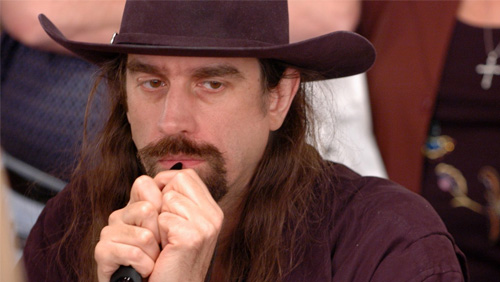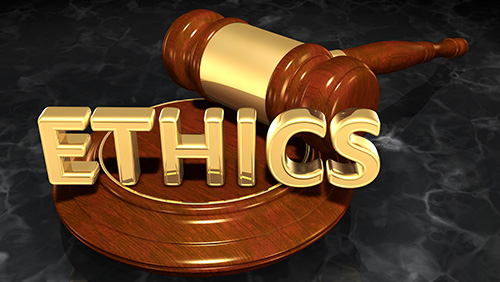After Chris Ferguson finished atop of the World Series of Poker Player of the Year leaderboard with the World Series of Poker Europe to come, Lee Davy, wants the poker world to consider creating the moral police.
 The Global Poker Index (GPI) stat-man Eric Danis stands below a large drape of Mike Gorodinsky, the 2015 World Series of Poker (WSOP) Player of the Year. The media creates a human enclave, cameras and pens poised to record the moment for those not lucky to have made the trip to the greatest poker tournament in the world.
The Global Poker Index (GPI) stat-man Eric Danis stands below a large drape of Mike Gorodinsky, the 2015 World Series of Poker (WSOP) Player of the Year. The media creates a human enclave, cameras and pens poised to record the moment for those not lucky to have made the trip to the greatest poker tournament in the world.
Gorodinsky is also in the crowd, much smaller than I imagined, and looking more like a man suffering delirium tremens than a coolness personified professional poker player.
After Danis releases his glowing tribute to the masses, he invites Gorodinsky to take the podium to begin Day 1c of the 2016 WSOP Main Event. I can’t think of a greater bastion to open the game than the man who proved to be the best of the best 12-months before.
And that’s what I think about when I look at the 2017 WSOP Player of the Year Leaderboard and see the name of Chris Ferguson perched on the top as if he has never been away from the game.
Irrespective of what happens in the Main Event, Chris Ferguson has proven he was the best card-for-card poker player in the 48th annual event. If the WSOP had not decided to hold a World Series of Poker Europe (WSOPE) in Rozvadov, this year, then Ferguson would be the man.
An inevitable process kicks in when someone wins the WSOP Player of the Year award. The brand should celebrate the man, and hold him up as a representative of all that is great about such a competitive event. The press should start figuring out headlines containing the name of the winner, celebrating what an outstanding achievement it was.
But this is Chris Ferguson, a man who played an integral part in the Full Tilt Ponzi scheme that damaged the lives of thousands of people all over the world, none more so than in the very country that hosts the WSOP. Here is a man who knew his return to the game would upset thousands of people, and did it anyway, all the time retaining his right to remain tight-lipped about the role he played in the madness that resulted in online poker disappearing off the face of the USA.
There was no apology.
There was nothing but silence.
All I see is pure, unadulterated selfishness.
And right now, he is the World Series of Poker (WSOP) Player of the Year in waiting.
How did the WSOP allow this to happen?
Does The Poker Community Want the WSOP to Become The Moral Police?
I wrote to the WSOP to ask them why they allowed Chris Ferguson to compete in their festival?
I never got an answer. Instead, I received a question:
Does the poker community want us to become the moral police?
Yes.
No.
I don’t know.
I reached out to Alex Dreyfus, the owner of the Global Poker League (GPL), GPI, Hendon Mob, and a man who understands the importance of protecting poker’s image, to ask him if he would allow Ferguson to compete in the GPL?
“That’s an interesting question,” said Dreyfus. “To participate in the GPL, you need to be drafted, which is unlikely. But I don’t think it would be legit to ban him from open events like the WSOP. That said, for a marketing platform like GPL, it would be controversial, and it wouldn’t help what we want to achieve.
“Poker is about money, especially live events, so having more players keen to buy-in is good for other players. Let’s not be naive, there are dozens of players who have a criminal record or have ‘shady money,’ and that’s the case in any poker tournament anywhere in the world, so I don’t think we should ban him from the WSOP.”
I think Alex is a tad conservative when he says dozens, and he does have a point when you consider the three-time bracelet winner, Dutch Boyd’s point of view.
“The guy who invented the World Series of Poker, Benny Binion, was a convicted murderer,” said Boyd. “It would be absurd for the WSOP to start banning people for immoral behaviour off-property.”
But the WSOP does ban people for on-property issues with Salomon Ponte a case in point.
Ponte played up at a Caesars Casino, broke the rules, and paid the price with a ban, including the WSOP.
“Banning someone because of a behaviour in your property or breaching the rules of your property, yes,” said Dreyfus, “But banning someone for something he did, but you have zero legal grounds, policy, or justification, then the answer has to be no.
“It’s like the GPI. I wouldn’t ban Ferguson from being the GPI #1 because we rank players based on their results. If the top player kills someone, it doesn’t change those results.”
Several months ago, Ponte wrote to the WSOP to seek redemption so that he could compete in the Main Event. The WSOP said no. The following statement was amongst the many reasons they declined his request, and it shows that a company like the WSOP have other means at their disposal if they don’t want a player competing in one of their events.
“Your social media campaigns. They are being watched as well and factor into any decision-making we may take in the future.”
So if the WSOP won’t ban him, Ferguson, will anyone else?
PokerStars already has.
The PokerStars Ban
Chris Ferguson cannot play on the PokerStars online platform, nor can he compete in a PokerStars live event. But this wasn’t a decision based on the morals and ethics of PokerStars.
As part of the 2012 deal with the Department of Justice (DOJ) that saw PokerStars acquire the assets of Full Tilt Poker (FTP), the DOJ expressly forbid PokerStars from associating with an extensive list of villains, of which Ferguson was a member. A similar deal exists in New Jersey, so PokerStars cannot allow Ferguson to compete on their online platform or live events in the Garden State.
If the DOJ and the New Jersey Division of Gaming Enforcement (DGE) won’t allow PokerStars to let Ferguson compete in any of their events, doesn’t that send the message that he is not welcome in any poker related event?
I wonder what would happen if Ferguson, cowboy boots and all, rocked up to a WSOP event held in Atlantic City?
Morals and Ethics
A few weeks ago, the poker community suffered from yet another scandal, when it emerged that the online poker room PKR were going into liquidation leaving thousands of players in the dark as to where their money ($2m+) was.
PokerStars saved the day by paying for those funds, and placing them into PokerStars accounts for the former PKR players to access. It was a sweet piece of business, but it was also a statement to the poker industry, that we should not tolerate this behaviour.
All of the companies that rely on poker for their income, and I count myself in that hoard, have a mutual interest in the poker industry attaining high moral, and ethical standards. Without these standards, it’s difficult for the poker industry to attract mainstream sponsors. We cannot grow outside of our little bubble.
 Online poker rooms have rules in place that prohibit players from competing on their sites if they are involved in money laundering issues or anything else that contravenes the TOC tome.
Online poker rooms have rules in place that prohibit players from competing on their sites if they are involved in money laundering issues or anything else that contravenes the TOC tome.
I think it’s time that we created a TOC for ethics and morality.
PokerStars said they didn’t want to become the online poker police after rescuing PKR players, but someone needs to place the siren on top of their car so that the rest will follow.
Every week, there is a scandal breaking.
A prominent player is proven to be a cheat.
A prominent casino owner won’t pay his debts.
A prominent online poker room hasn’t segregated player funds.
We either accept that this is who we are, subterfuge and all. Or we make a decision to change.
I think we should choose the latter.
Learn a Lesson From eSports
The esports industry is expecting to hit revenues of $1.5 billion by 2020. It’s a young industry, far younger than poker, and yet they are managing to attract some of the biggest sponsors, and receive investment from the smartest entrepreneurs in the business.
In response to this growth, the industry created the Esports Integrity Coalition (ESIC) as a way to police the fundamental principles that the major stakeholders believe protect the business. ESIC created a Code of Ethics, and a series of rules that keep the threat of match fixing, betting fraud, and other integrity issues under scrutiny, with punishments, doled out for those that don’t conform.
How would ESIC have dealt with a Ferguson?
I speculate he would have received a ban.
Poker has a Tournament Directors Association (TDA) to govern the rules of our game. Yes, it’s not as cohesive as it could be, but it works to spread best practice.
It’s time to create a new acronym – one designed to police the fundamental principles that protect our business. The only way something like that is born is if the WSOP, World Poker Tour (WPT), PokerStars, 888Poker, partypoker, Unibet, Microgaming Poker Network, iPoker Network, GPI, GPL, all come together and say we have had enough. If you bring our game into disrepute, there will be consequences.
“The problem with poker is a lack of a governing body,” said poker writer Earl Burton. “We don’t have a FIFA or FIBA to hand down rulings on issues like this. The WSOP and Vegas casinos already have the “Black Book” but, short of being in that, there’s not much they can do about a situation when someone hasn’t been prosecuted. There have been attempts in the past to be a somewhat “governing body” (International Federation of Poker, International Fidpa -Federation Internationale de Poker Association, World Poker Association, etc.), but there isn’t a unifying banner that the players, casinos and gaming organisations around the world can get behind.”
Come on.
Someone get the ball rolling.
888Poker once hired Luis Suarez.
He bit someone once too often.
888Poker severed their ties with him because they didn’t want their brand tarnished.
Can anyone remember what happened to Tiger Woods commercial deals when he was a naughty boy?
So why aren’t we acting the same way, when someone affects the integrity of our market?
World class poker player or not, Chris Ferguson was involved in a scandal that shattered out integrity, refused to talk about it, and then had the balls to sit down next to people he royally screwed as if nothing ever happened.
“No comment.”
Poker deserves more than that.
Will Ferguson win?
Will the poker industry create the change this industry needs?
I don’t know.
What I do know, is we will not be seeing Chris Ferguson taking the microphone at the beginning of Day 1c of the 2018 WSOP Main Event, because if he does, the people in the enclave won’t be using their sharpened pencils to record the moment. They will be using them like darts, and the once loved Jesus of poker will be the bullseye.